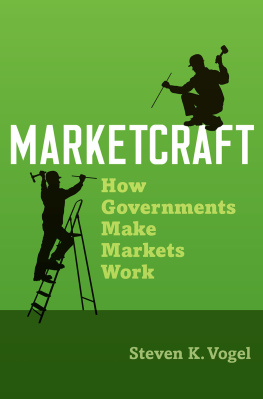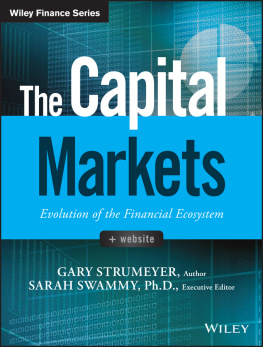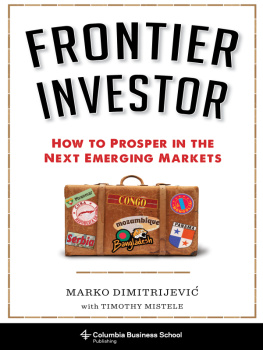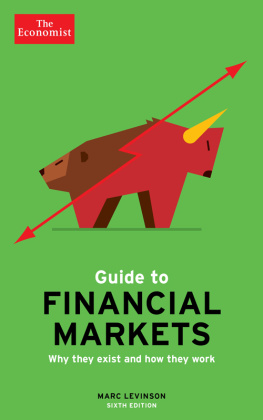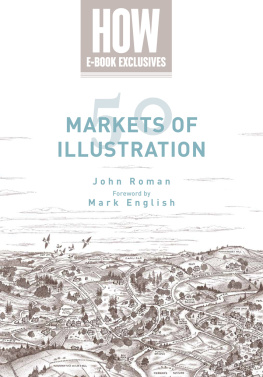Contents
Pagebreaks of the print version
Marketcraft

Oxford University Press is a department of the University of Oxford. It furthers the Universitys objective of excellence in research, scholarship, and education by publishing worldwide. Oxford is a registered trade mark of Oxford University Press in the UK and certain other countries.
Published in the United States of America by Oxford University Press 198 Madison Avenue, New York, NY 10016, United States of America.
Oxford University Press 2018
All rights reserved. No part of this publication may be reproduced, stored in a retrieval system, or transmitted, in any form or by any means, without the prior permission in writing of Oxford University Press, or as expressly permitted by law, by license, or under terms agreed with the appropriate reproduction rights organization. Inquiries concerning reproduction outside the scope of the above should be sent to the Rights Department, Oxford University Press, at the address above.
You must not circulate this work in any other form and you must impose this same condition on any acquirer.
Library of Congress Cataloging-in-Publication Data
Names: Vogel, Steven Kent, author.
Title: Marketcraft : how governments make markets work / by Steven K. Vogel.
Description: New York, NY : Oxford University Press, [2018] |
Includes bibliographical references.
Identifiers: LCCN 2017035193 (print) | LCCN 2017044751 (ebook) |
ISBN 9780190699864 (updf) | ISBN 9780190699871 (epub) | ISBN 9780190699857 (hbk)
Subjects: LCSH: Free enterprise. | Capitalism. | Trade regulation. |
Economic policy. | Commercial policy.
Classification: LCC HB95 (ebook) | LCC HB95. V646 2018 (print) |
DDC 381/.1dc23
LC record available at https://lccn.loc.gov/2017035193
To Justin, Ellie, and Juliette
May they live in a better governed world.
CONTENTS
This project had a long gestation, and many generously assisted along the way. I sketched some of my initial thoughts in a chapter for a volume called Creating Competitive Markets edited by Mark Landy, Martin Levin, and Martin Shapiro, and the editors and author chapters provided valuable feedback. I am especially grateful to the many government officials, business people, and scholars in the United States, Japan, and Europe who agreed to be interviewed for this project. Many colleagues helped to arrange the interviews, including Tetsuya Kagaya, Mindy Kotler, Jun Kurihara, Manabu Nabeshima, Ichiya Nakamura, Peter J. Ryan, Masaaki Sakamaki, Pamela Samuelson, and Nicolas Vron.
Robert Fannion has been an incredible intellectual partner throughout this process, from early-stage brainstorming through brilliant feedback to intensive editing. I have been fortunate to work with an amazing group of doctoral students. In many instances, we reversed roles and they became my best dissertation advisers. Mark Huberty brought me up to speed on some of the key substantive issues at the early stages of research. Alex Roehrkasse educated me on some of the finer points of economic sociology, and provided critical feedback and editing on drafts. Kristi Govella meticulously researched Japanese policies, gathered critical data, and updated me on the latest research in my own field, political science. Brian Judge refined my understanding on theoretical issues and provided comments on the concluding chapter. Jay Varellas tutored me on the arcane details of the law, and offered valuable suggestions for further reading. Akasemi Newsome strengthened my grasp of key elements of the US case. Makoto Fukumoto helped me to find Japanese government documents and to update the sections on Japanese reforms. Maurice Ang, Jongwan Choi, Alex Duran, Trevor Incerti, Sae Kobayashi, Reina Sasaki, Taka Tanaka, Guillermo Tosca Daz, and Amanda Zhao all provided superb research assistance.
Neil Fligstein, Ezra Vogel, and two anonymous reviewers for Oxford University Press read the entire manuscript and offered valuable comments. Charles Duan, Kenji Kushida, David Makman, Elsa Massoc, Mari Miura, Manabu Nabeshima, Hiromitsu Ohtsuka, Karthik Ramanna, Daniel Rubinfeld, Toshiko Takenaka, Takakuni Yamane, Hidehiro Yokoo, and John Zysman kindly reviewed excerpts.
I presented papers related to this project at my home departments Comparative Politics Colloquium; a Japan Forum for Innovation and Technology (JFIT)/Stanford Project on Japanese Entrepreneurship (STAJE) Conference at the University of California, San Diego; and a Society for the Advancement of Socio-Economics (SASE) Annual Meeting in Berkeley. Participants offered valuable feedback, especially discussants Nathan Pippenger, Ulrike Schaede, and Yves Tiberghien. I also presented my work at a Center for Japanese Studies faculty luncheon on campus, and benefited from questions and discussion.
Robert Cooter, Barry Eichengreen, Marion Fourcade, Paul Pierson, and Zenichi Shishidoas well as the previously mentioned Fannion, Govella, Judge, and Roehrkasseparticipated in a book manuscript workshop hosted by the Institute for International Studies at the University of California, Berkeley. All participants provided fabulous feedback and specific suggestions for improvement. Three Berkeley colleagues from other departmentsGeorge Lakoff, Daniel Rubinfeld, and Carl Shapirogenerously agreed to meet with me for some brainstorming and a bit of a tutorial in their respective areas of expertise.
I am grateful for a Japan-US Friendship Commission and National Endowment for Humanities Fellowship for Advanced Social Science Research on Japan. I also received generous financial support from the Committee on Research, the Center for Japanese Studies, and the Il Han New Chair at the University of California, Berkeley.
David McBride, Claire Sibley, and Emily Mackenzie at Oxford University Press masterfully guided the manuscript from review through publication; Prabhu Chinnasamy oversaw production; and Dorothy Bauhoff handled the copy editing.
Most of all, I thank my wife Giena for her love and support.
Marketcraft
Consider the corporation, the institution at the heart of modern capitalism. There is nothing natural about it. The corporation is a construct that is granted legal identity, governing authority, and limited liability by the law. Or consider the stock market, the ultimate embodiment of the capitalist ethos. It is likewise neither free nor natural, but rather elaborately governed. Stock markets require trading rules not only to prevent abuses, but also simply to operate. And they need more extensive rules, such as corporate disclosure requirements and insider trading restrictions, to flourish and to grow. The following chapters review these and other examples in greater detail, demonstrating how and why governments make markets work. But first, this chapter outlines the core thesis of the book.
The argument begins with the basic recognition that real-world markets are institutions: humanly devised constraints that shape human interaction. In this book, I contend that a more expansive definition of market institutions is not simply more accurate, but that it is a prerequisite for informed policymaking and analysis of real-world markets.
I am certainly not the first one to pursue this line of argument. In fact, a market-institutional perspective on political economy has emerged as a virtual consensus among policymakers and across social science disciplines when applied to markets everywhere

